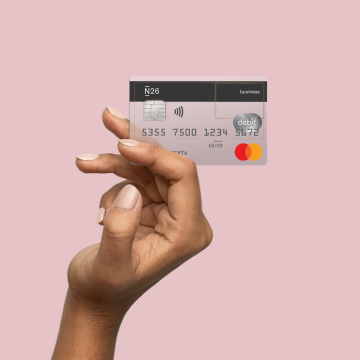
Freelancing FAQs: everything you need to know about freelancing
Going freelance is a big career change and may leave you confused. Read answers to the most commonly asked questions about freelancing.
1 min read
Deciding whether to become a freelancer? You may have many questions and concerns about taking the next step in becoming a self-employed professional. But don’t worry, our guide is here to help—from giving advice on landing your next freelance jobs and explaining how to do taxes as a freelancer, to how to get clients and set your hourly and monthly rate. On top of this, we’ll help you understand freelancer contracts and invoices, show you how to develop your freelancer brand, and much more.So, if you’re keen to become your own boss, explore our selection of common freelancer FAQs to find the answers to your pressing questions. Read on below!Also remember that N26 is a collaborating entity with the Social Security, which means that you can pay your self-employed cuota (cuota de autónomo) directly from your account, as well as pay the Social Security contribution if you have someone hired. In case you are looking for a new bank! Find the perfect N26 Business plan for you!If you're freelancing, you know every detail counts. N26 Business accounts are designed to make your professional life easier: manage payments, control your income, and access smart tools to save time and money. Plus, you'll get 0.1% cashback on all your purchases.Change the way you manage your finances: discover the account that adapts to you and stop worrying. Open your free N26 business bank account now and start enjoying banking for freelancers and the self-employed.
How to start your own business
Discover N26 accounts for freelancers and self-employed
Freelancing is a type of self-employment that allows knowledge workers to earn a living by selling their services on a contract or project basis. Instead of being employed by a company, freelancers can operate under a range of legal business forms. They are responsible for paying their own taxes, pension and other personal contributions. In the simplest sense, freelancing is a small business.
Companies tend to hire freelancers over regular employees when they need a specific skill or talent on their team. Companies might also look for freelancers when they have a sudden but temporary increase in workload and/or a specialized project. Hiring regular employees can also be very expensive for companies, so recruiting freelancers can provide a cheaper solution to fill a role quickly.
Anyone can start freelancing from home as long as they have skills that are in demand. Before making the leap, you should spend time figuring out your unique selling points (USPs), defining your target audience and your niche to have a successful start,
Yes! You can start freelancing while studying or working full-time. Many freelancers choose that option to avoid financial strains, or in order to build up their portfolio and client base. While it requires a fierce dedication and discipline, freelancing while employed is a great way to make the transition to running a profitable business and being your own boss.
Most freelancers choose to become sole traders (self-employed) because it’s the easiest and most cost-effective option for new starters. However, there are other legal entities that freelancers working on their own can consider—for instance, a limited liability company or a partnership. Read more about the different legal setups and how to register your freelance business.
If you’re just starting out, the easiest way to calculate your freelance day rate is to base it on your most recent basic salary. You can use the following calculation formula as a starting point: (your annual basic salary + 30%) divided by 220 days. The uplift of 30% accounts for the lost benefits, such as holiday, sick pay or pension contributions, while 220 days is an estimate of the total number of days you’re likely to work in a year. See how much freelancers make on average.
Yes—this is very important! When you start working for yourself, you’re automatically classed as a sole trader (self-employed.) Even if you haven’t notified your local tax authority yet, you are obliged to pay taxes on everything you earn as a freelancer. Here’s everything you need to know about registering your freelance business.
Freelancers are not legally required to have a separate business account—however, most choose to open one. Keeping their business and personal finances separate allows freelancers to better track all the money coming in and out of their account, as well as simplifying the tax return process. Our N26 Business You account for freelancers offers premium advantages, such as 0.1% cashback on all purchases and free card payments online. And N26 Business Metal takes you even further, delivering a huge 0.5% cashback!
The biggest difference between a personal account and a business bank account is how they’re used. Personal bank accounts are designed for personal, day-to-day use, while business accounts are dedicated to business spending only. Having a business bank account removes the pain from keeping track of business expenses and receipts. Read more on the differences in our blog Can I get a business bank account?
Freelance marketplaces are a great way for beginners to find work, build up their skillset and their portfolio. The top 4 freelance platforms are Fiverr, Upwork, PeoplePerHour and Freelancer.com. There are pros and cons to each platform, but it is recommended to join more than one to widen your opportunities. Find more details in our summary of the 4 best freelance platforms to support and grow your business.
As a solopreneur, you are the face of your freelance business. Defining and carefully building a personal brand is one of the most effective, long-term growth strategies that will help your business flourish. You need to define what sets you apart from other freelancers in order to define your brand, and then this can be communicated using your website, email signatures and any assets you share with potential clients. Read our guide to personal branding for freelancers.
Some freelance skills are more in-demand than others, so it’s crucial for new starters to stay on top of industry trends and client requirements. If you are considering going freelance it’s most likely that you have a clear set of skills already, but the most in demand skills include web development, design skills and copywriting. Here’s our list of highly lucrative freelance skills that can help you land the next breakthrough project.
It’s important you spend time drawing up your freelance contract and payment terms before taking on any work. This gives you the opportunity to outline your payment terms for the client to agree to. It should also outline information on timelines and turnarounds as well as deadlines. There are many free freelance contract templates available online that you can use for your business.
There are a few tried-and-trusted strategies that can help you generate leads and ultimately find freelance work. We recommend starting by establishing a strong presence on relevant social media channels, building a robust portfolio and a personal website.
There is no single software that is perfect for managing all types of freelance projects. However, many freelancers recommend Trello, Asana and Wrike as leading tools for organizing your workflows. See our guide to project management for freelancers.
As a freelancer, your payment options are pretty straightforward—the common method is to issue invoices for the hours billed or projects delivered. However, some freelancers go a step further and make the payment process even easier by accepting card payments and direct debits.
Your tax rate will depend on the amount of taxable business income and the country you operate in. It’s best to budget for tax returns by setting aside 25-30% of everything you earn as a freelancer as a general rule. Read more in our article about all things taxes for freelancers.
Absolutely! You can start freelancing at any time. Going into freelance while studying is an excellent way to earn a side income as well as develop marketable skills that might help your future career.
You need to make sure you get your invoice right to get paid on time. It’s best to go with a simple yet functional design that provides all the key information in a clean format. Download one of our free templates to get started quickly. We’ve provided two invoice templates to help new freelancers.
Some of the easiest ways to promote your services include promoting your profile on freelance job sites and running social media ads. You could also utilize content marketing tactics, such as optimizing your website and doubling down on word-of-mouth marketing, by emailing contacts your availability and asking them to spread the word.
Many freelancers rely on freelance marketplaces and job sites for generating new leads. LinkedIn is another increasingly popular place for landing new freelance gigs online. Depending on the services you offer, other social media could be a good place to share your portfolio, for example if you’re a photographer then Instagram is a great platform to share your snaps. Read our guide to getting customers as a freelancer.
Due to a fluctuating income and an unpredictable new business pipeline, freelancers are generally advised against taking out a credit card. However, as sole traders with a somewhat steady business income, they can technically get a credit card for business or personal use.
If you want to end a business relationship with a client, be sure to check your contract first and provide plenty of notice. While you don’t need to give the client a long-winded explanation of why you’re moving on, it’s best to part on good terms and provide a brief reason and an end date.
The key to saving money as a freelancer is budgeting. Be sure to stay on top of your spending and classify your business expenses correctly. Remember that whilst expenses have tax savings, they are still costs so be aware of purchasing only what you need for your work. Working from home can offer a big saving on travel and renting a workspace, if it is a possibility for you.
The short answer is yes. It’s important to note that different lenders will have different regulations and criteria so you should read the terms and conditions. Many freelancers find they need a larger than standard deposit to get approved for a mortgage.
Carrying the right type of insurance as a freelancer can help you protect yourself from errors, omissions and any other type of malpractices. The two most common options are liability insurance and indemnity insurance, but you can also get policies for income insurance, health insurance, cyber security insurance and more.
Find similar stories
BY N26Love your bank
Related Post
These might also interest youFREELANCERSHow much do freelancers make? A guide to the average freelancer salarySalary is a big consideration when thinking about going freelance. Read our guide to find out average hourly rates for a number of industries.
6 min read
FREELANCERSWhat is freelancing and how does it work?New to freelancing? Let us guide you through the intricacies of setting up as a freelancer and what you can expect after making the switch.
7 min read
FREELANCERSSelf-Employment in Germany: a Beginner’s GuideBeing a freelancer comes with lots of perks, but the journey into self-employment isn’t always easy. Don’t worry, though! In this guide, you’ll learn all there is to know about becoming self-employed.
11 min read



